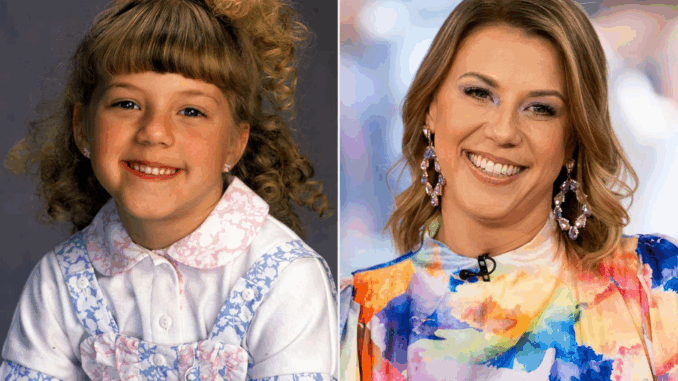
Andrea Barber and Jodie Sweetin Agree with Fans’ Opinions About Full House
The beloved sitcom Full House has been a staple in American television since its debut in 1987. Over the years, fans have speculated about the sexual orientations of various characters, and now, two of the show’s stars, Andrea Barber and Jodie Sweetin, have shared their own thoughts on the matter.
A New Perspective on Classic Characters
In a recent episode of their rewatch podcast, How Rude, Tanneritos!, Andrea Barber and Jodie Sweetin discussed which characters from Full House they believe might be queer. Their insights offer a fresh perspective on the beloved series and highlight the evolving conversations around LGBTQ+ representation in media.
Jodie Sweetin’s Take on Stephanie Tanner
Jodie Sweetin, who portrayed Stephanie Tanner, expressed her belief that her character was “somewhere to the right on the Kinsey scale.” She pointed to a moment in Fuller House, the show’s sequel series, where Stephanie casually mentions having had a girlfriend in the past. Sweetin noted that this line was ad-libbed, adding authenticity to the character’s implied queerness.
Andrea Barber’s View on Kimmy Gibbler
Andrea Barber, who played Kimmy Gibbler, shared that her character does not conform to traditional labels. Barber suggested that Kimmy might be pansexual, emphasizing that Kimmy loves the person, not the package. This interpretation aligns with the growing recognition of pansexuality in contemporary discussions about sexual orientation.
Blake McIver Ewing’s Character Derek
The actresses also discussed the character Derek, portrayed by Blake McIver Ewing. They speculated that Derek likely grew up to be queer, reflecting on the subtle cues in his character’s development that may have been overlooked during the original airing of the show.
The Evolution of LGBTQ+ Representation in Media
The discussion between Barber and Sweetin underscores the importance of revisiting classic shows through a modern lens. It highlights how perceptions of characters can evolve over time and how media can serve as a platform for exploring diverse sexual orientations.
The Impact of ‘Fuller House’
Fuller House, the sequel series to Full House, introduced the character Casey, portrayed by transgender actress Miss Benny. This marked a significant step forward in LGBTQ+ representation on mainstream television. The inclusion of such characters reflects the industry’s growing commitment to inclusivity and diversity.
Fan Reactions and Community Engagement
Fans of Full House have long speculated about the sexual orientations of various characters. The revelations by Barber and Sweetin have sparked renewed interest and discussion among the show’s fanbase. This engagement demonstrates the lasting impact of the series and the continued relevance of its characters.
The Importance of Representation
The conversation between Barber and Sweetin highlights the significance of representation in media. By acknowledging the potential queerness of their characters, they contribute to a broader dialogue about the importance of diverse sexual orientations being portrayed in television shows.
Reflections on the Original Series
Looking back at the original Full House series, both actresses acknowledged that discussions about sexual orientation were not prevalent at the time. However, they expressed that the show’s portrayal of family dynamics and relationships laid the groundwork for more inclusive storytelling in later years.
The Role of Podcasts in Reexamining Media
The How Rude, Tanneritos! podcast serves as a platform for revisiting and reinterpreting Full House. Through candid discussions and reflections, Barber and Sweetin offer fans a deeper understanding of the series and its characters, fostering a space for critical engagement with media.
The Future of LGBTQ+ Representation in Reboots
The success of Fuller House and its inclusion of LGBTQ+ characters suggests a positive trend for future reboots and spin-offs. As audiences continue to advocate for diverse representation, it is likely that more shows will follow suit, incorporating characters of various sexual orientations into their narratives.
Conclusion
The insights shared by Andrea Barber and Jodie Sweetin provide a refreshing perspective on the characters of Full House. Their openness about the potential queerness of their roles encourages a broader conversation about LGBTQ+ representation in media. As society progresses, it is heartening to see classic shows being reexamined and appreciated through a more inclusive lens.
FAQs
Q1: Did Andrea Barber and Jodie Sweetin confirm their characters’ sexual orientations?
A1: While they did not provide definitive labels, both actresses suggested that their characters exhibited traits that could be interpreted as queer.
Q2: What prompted the discussion about LGBTQ+ representation in Full House?
A2: The conversation was initiated during an episode of their rewatch podcast, How Rude, Tanneritos!, where they addressed fan questions about the characters’ sexual orientations.
Q3: How did fans react to Barber and Sweetin’s comments?
A3: Fans have expressed appreciation for the actresses’ openness, with many engaging in discussions about the implications of their insights on the show’s legacy.
Q4: Are there other instances of LGBTQ+ representation in Fuller House?
A4: Yes, the character Casey, portrayed by Miss Benny, is an openly queer character, marking a significant step in LGBTQ+ representation on the show.
Q5: How does this discussion impact the perception of Full House?
A5: It encourages viewers to reconsider the series with a more inclusive perspective, highlighting the evolving understanding of characters and their potential identities.
